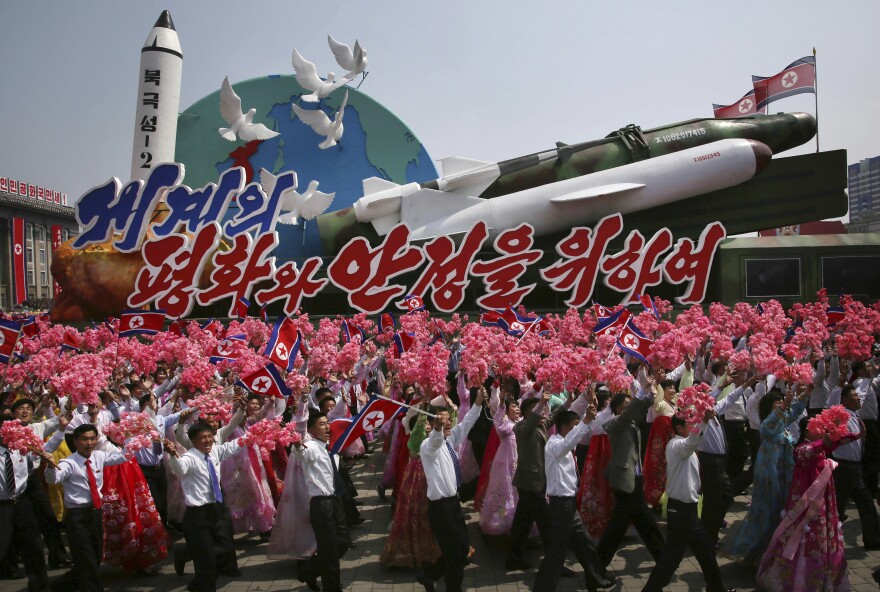North Korea now has its own version of Spam in grocery stores. In the capital, Pyongyang, at least, everyone has a smartphone — or two.
These are some of the things journalist Jean Lee didn't see five years ago when she opened the Associated Press bureau in the capital of the impoverished and isolated country.
Now a global fellow at the Wilson Center, Lee was invited to travel to North Korea this week to attend a medical conference in Pyongyang and follow a team of Korean-American surgeons.
With the backdrop of tense relations between North Korea and the U.S., Lee spoke with All Things Consideredfrom Pyongyang about what life is like in the North Korean capital these days.
On North Koreans' reactions to political tensions with the U.S.
It's amazingly calm. You would be surprised at how calm things are here, and I have to say that like most North Koreans, I've been largely cut off from the screaming headlines that we've been seeing. I didn't have Internet access for several days. And, as you probably know, most North Koreans don't have Internet access. They get their news from their own state media, so unless they read about it in their own state media, or see it on the evening news, they're not very aware of it.
To be honest, it's remarkable, we are not seeing people who are preparing for war. They've had a month, really, of some big anniversaries. They celebrated May Day. I did go to a May Day celebration in the park, where they were singing and dancing and drinking.
But they're getting ready now for a busy season of rice planting in May, so they're gearing up for that. They are completely unfazed, it seems, by all the rhetoric that we're hearing overseas.

On what has changed since Lee's last trip to North Korea
I have to point out that I've only been in Pyongyang, which is the showcase capital. This is a city of elites, and so I'm only getting that side of the picture. It's like only going to Manhattan, rather than seeing the rest of the United States.
That said, it's surprising given what we hear about the sanctions how things have progressed. Everybody has a smartphone — sometimes two. Everybody is on their phones. They're all playing video games. They're doing what we do with our cellphones as well, they're checking the news, messaging their friends.
There's quite a bit more English, which is interesting. English is the main language that children learn here. There's certainly a lot more cars, which is surprising given the concern about fuel shortages.
I did some shopping today ... and it's just amazing the kinds of products that they have on the shelves. [That] certainly wasn't the case when I started coming to North Korea. So, in some ways, life has improved for the people of Pyongyang.
That said, I think that things are still incredibly difficult in the countryside. They have a chronic food shortage, and that's only going to get worse, of course, with the tightened sanctions.
On the wide variety of products available in local stores
I saw so many varieties of potato chips, varieties of canned goods, what would be their equivalent of Spam, for example, but all kinds of things — computers, tablets, PCs — all kinds of things that you might not expect to see in a country that is still very poor.
On the recent detention of a Korean-American professor
I'm certainly familiar with [ the case of Tony Kim]. As a Korean-American, this is something that anyone who comes here on a regular basis would be paying attention to.
But the North Koreans didn't hear about it until earlier this week when it was reported in their state media. So it certainly was something that we discussed as a group with our North Korean guides, was the first that they had heard about it. And we don't really have a lot of details, and so we'll certainly be waiting and watching to see what he is being accused of.
They have a very, very exhaustive penal code, and it is very easy to break those laws, and that's what makes being here dangerous for anyone.
All Things Considered producer Matt Ozug and digital producer Maureen Pao contributed to this report.
Copyright 2020 NPR. To see more, visit https://www.npr.org. 9(MDAyNDY5MjM1MDEyODE2MzMyMTZmZDQwMg001))







